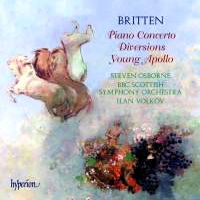
Wit and Energy
Music for piano and orchestra
by Benjamin Britten,
enjoyed by
ROBERT ANDERSON
Hyperion CDA67625
|

|
This is Britten's complete output for piano and orchestra, all of it young-man music, with red corpuscles coursing strongly through the veins. There was some later revision, and Apollo was withdrawn after its second performance, remaining silent till after Britten's death; but essentially the three works were performed and discussed before Britten was twenty-eight. With later and more rarefied Britten better known to us, it is easy to forget with what pulsating vitality he burst upon the musical scene.
It is a special feature of this CD that both versions of the concerto's third movement are included, the original Recitative and Aria, plus the Impromptu of 1945. With hindsight one can understand Britten's reason for the substitution. The preceding waltz movement had provided all that needed to be said in that particular rhythm; it was otiose to suggest yet more waltzing in the Aria. The opening Toccata is a pounding humdinger of a piece.
Listen -- Toccata (Piano Concerto)
(track 1, 0:02-1:13) © 2008 Hyperion Records Ltd
Britten gave its first performance at a Prom under Henry Wood, an index of his superb technique. Nor does Steven Osborne seem to bat an eyelid, as he cascades through its hair-raising difficulties. The concluding March is no less thrilling.
Listen -- March (Piano Concerto)
(track 4, 0:00-1:40) © 2008 Hyperion Records Ltd
The Young Apollo, image of the Greek sun-god rising from the waves in his four-horse chariot at dawn, is again extravert and strong. Textures are subtly varied, with a string quartet detaching itself from the main string orchestra to interplay with the soloist. This was a Canadian commission, and once more Britten gave the first performance. The music soon makes clear that we are in the radiance of the Mediterranean world rather than in the land of Britten's birth or that of his temporary adoption.
Listen -- Young Apollo
(track 6, 0:01-1:47) © 2008 Hyperion Records Ltd
The Diversions were written for Paul Wittgenstein, one-armed pianist and brother of the formidably philosophical Ludwig. He badgered a remarkable tally of eminent composers to write left-hand works for him. Britten obliged with a set of testing variations, which pause for thought in the central Arabesque, Chant, and Nocturne, while perhaps also mindful of the musical Ludwig in the deeply pondered Adagio. But Wittgenstein was determined to be the disabled virtuoso, and Britten cunningly indulged him, as in the March of variation 3.
Listen -- Variation III: March (Diversions)
(track 10, 0:00-0:24) © 2008 Hyperion Records Ltd
Soloist and orchestra under Ilan Volkov are much teased by the composer; the result is wit and energy in abundance.
Copyright © 8 October 2008
Robert Anderson, Cairo, Egypt

Britten: Piano Concerto; Diversions; Young Apollo
CDA67625 DDD Stereo NEW RELEASE 71'16" 2008 Hyperion Records Ltd
Steven Osborne, piano
Scott Dickinson, viola (Piano Concerto waltz)
BBC Scottish Symphony Orchestra
Ilan Volkov, conductor
Benjamin Britten (1913-1976):
Piano Concerto in D Op 13 (1938, revised 1945) (Toccata: Allegro molto e con brio; Waltz: Allegretto; Impromptu: Andante lento - ; March: Allegro moderato - sempre alla marcia)
Original version of the third movement of the Piano Concerto (1938) (Recitative and Aria: Lento)
Young Apollo for piano, string quartet and string orchestra Op 16 (1939)
Diversions for piano (left hand) and orchestra, Op 21 (1940) (Theme: Maestoso; Variation I: Recitative: I'istesso tempo - maestoso; II: Romance: Allegretto mosso; III March: Allegro con brio; IV: Arabesque: Allegretto; V: Chant: Andante solennemente; VI: Nocturne: Andante piacevole; VII: Badinerie: Grave - Vivacissimo; VIII: Burlesque: Molto moderato; IXa: Toccata I: Allegro; IXb: Toccata II - Cadenza: I'istesso tempo; Variation X: Adagio; Finale: Tarantella: Presto con fuoco) |
BUY CLASSICAL CDS ONLINE
Record Box is Music & Vision's
regular series of shorter CD reviews
|

